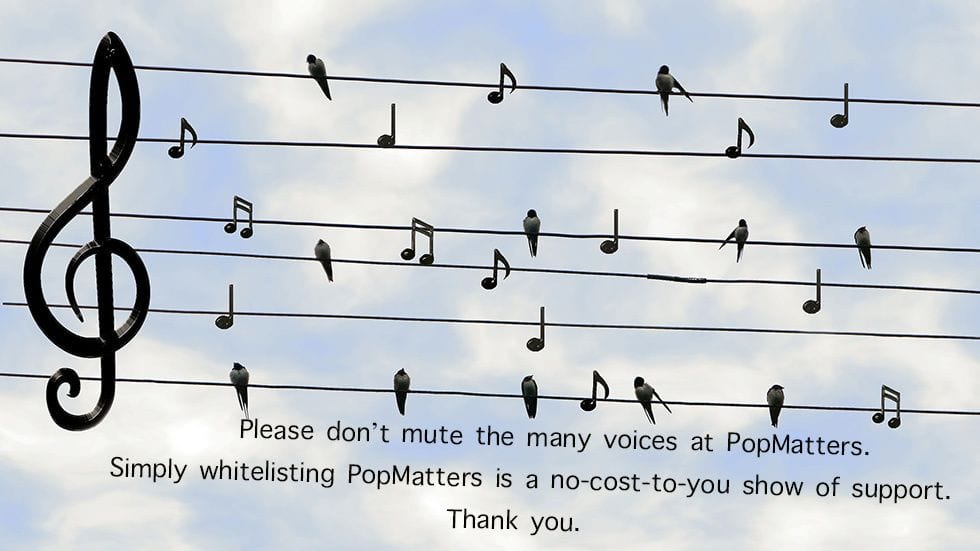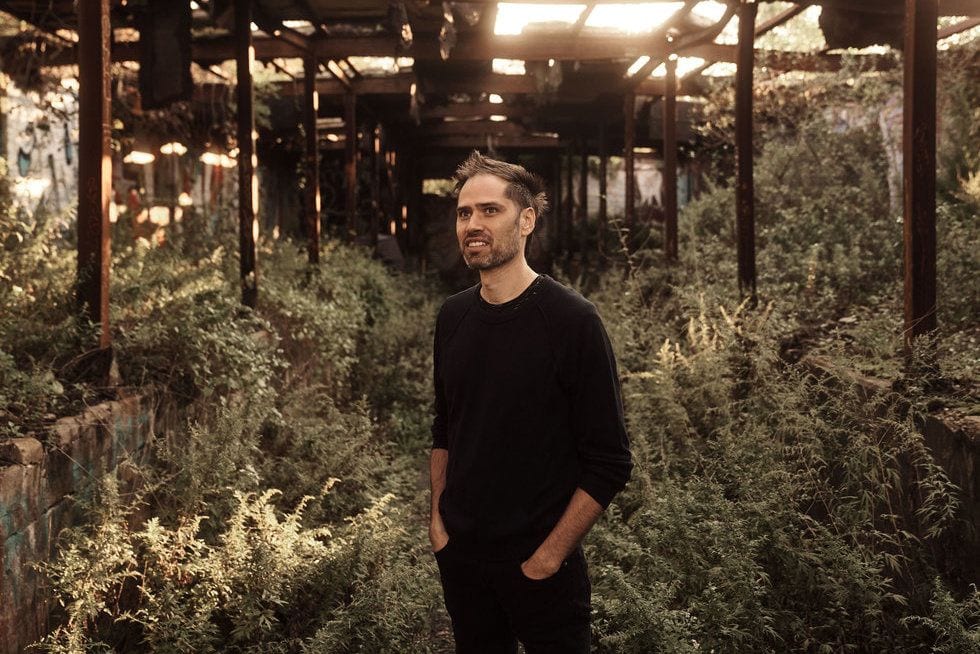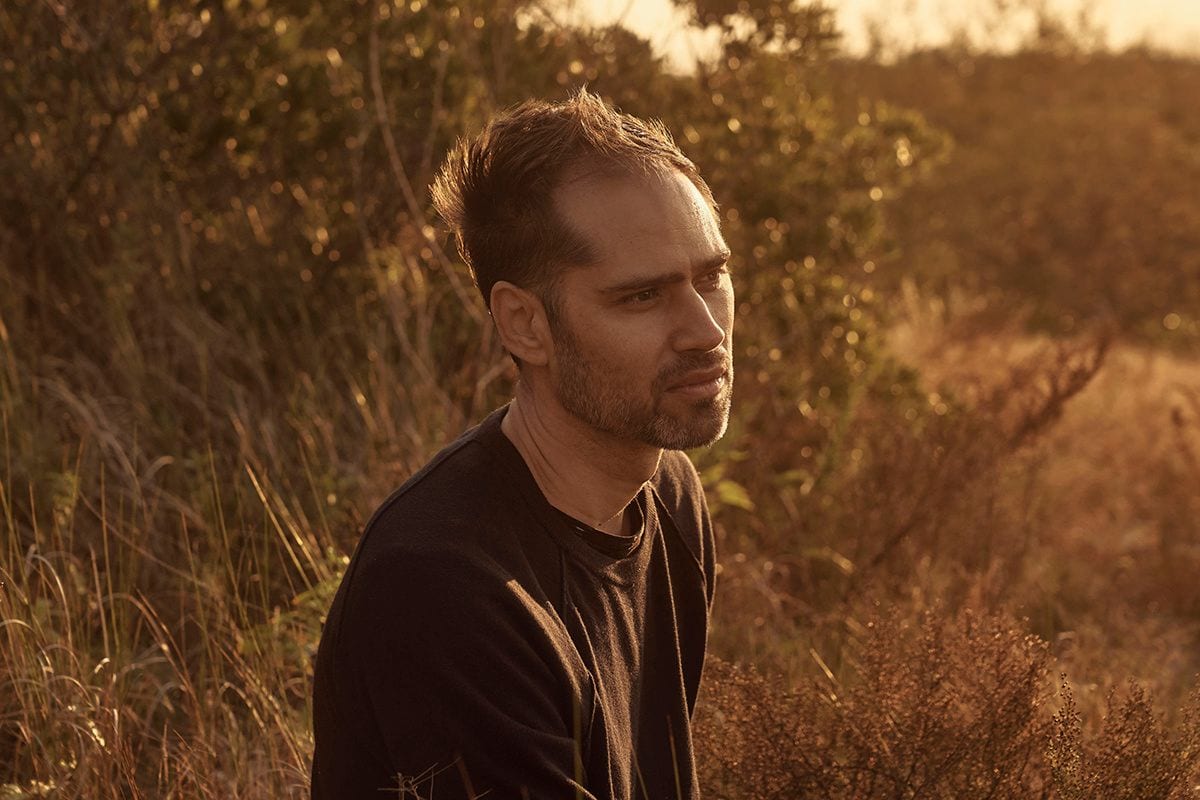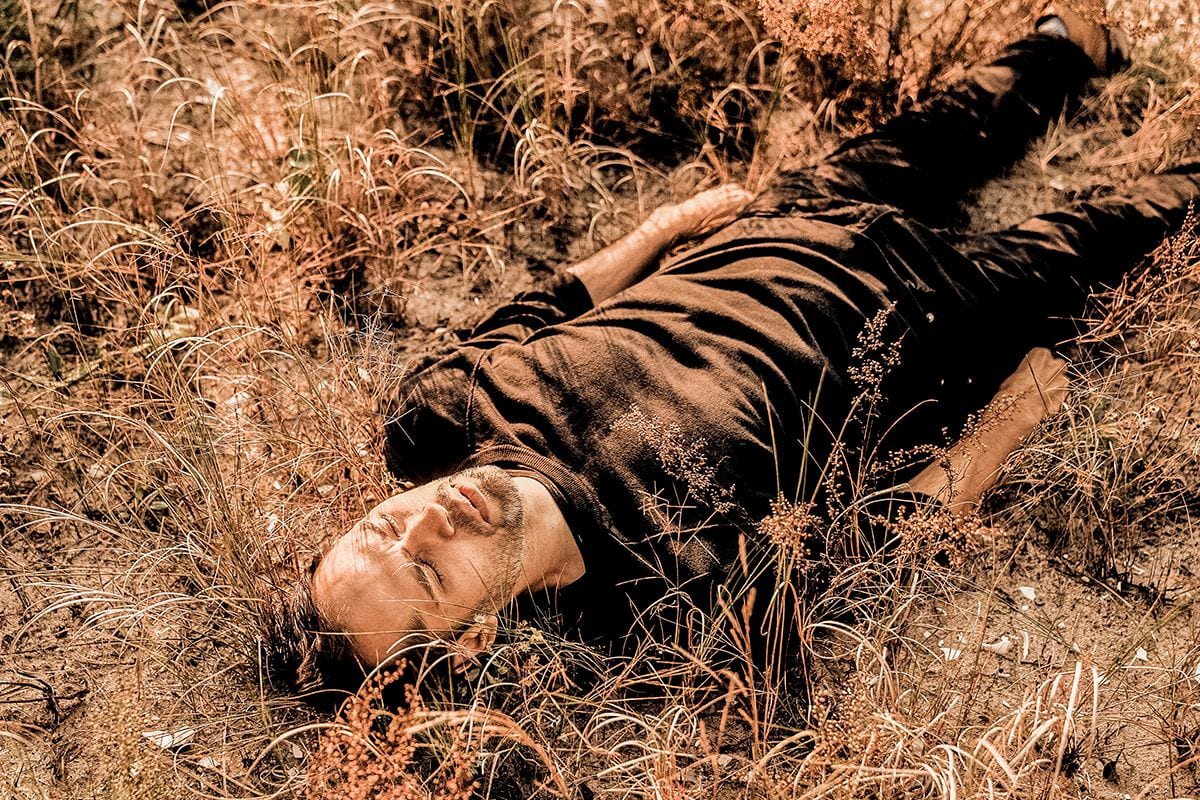
Composer William Brittelle holds a unique place amidst the diversity of identities in the contemporary classical music world. He values the influence of dense weight academic music as much as punk rock, having both studied with modernist composer David Del Tredici and collaborated with Richard Lloyd from Television. Brittelle has composed works for ensembles ranging from the Grammy-winning Roomful of Teeth, the Seattle Symphony, and the Gothenburg Symphony Chamber Series in Sweden among scores of others. Perhaps most notable, Brittelle is a co-founder/co-artistic director of New Amsterdam Records, the label most clearly defining the exciting new landscape of contemporary music today.
Spiritual America, his latest record, defies traditional genre conventions through fusing elements of traditional classical, electronic music, and shredding rock guitar through a narrative of crisis and faith. Influenced by a struggle of faith spurned by a personal crisis, Spiritual America was composed in part to reconcile Brittelle’s childhood growing up in a conservative, religious household in North Carolina with his current life in Brooklyn living as an “agnostic Buddhist”. This interview was captured as Brittelle was composing a new work, a piece for harpsichord inspired by the original NES Metroid game.
First and foremost, congratulations on this excellent record. It finds a striking balance between physical and digital musical elements. Do you mind talking a bit about the gestation process for this project?
This project was definitely on a scale larger than anything I’ve ever worked on. It was seven and a half years from when I originally started working on it to the release of the record. There wasn’t, I would say, a single moment of realization of gradually working through things personally, spiritually, and musically and that all sort of mixed together into this all-encompassing project that ate up my life (laughs).
The promotional material for Spiritual America describes it as a reconciliation between your conservative upbringing in North Carolina and your life in Brooklyn as an “agnostic Buddhist.” Can you go into more detail about how you define “agnostic Buddhist?”
Essentially non-religious Buddhism. I don’t believe or not believe in reincarnation or karma or things that are, depending on your viewpoint, things that are a little bit more esoteric. It’s just more, for me, a way of trying to stay calm and centered and focusing on those aspects.
I have to say, too, that it’s really difficult to sum up a project like this in a couple of sentences for a press release. It’s like the least press release friendly musical project that I’ve ever had. I think part of what I started to realize over the seven-year period is that the spiritual support network I had for myself wasn’t capable of dealing… I felt the breakdown of my spiritual support system. I couldn’t meditate my way out of what was happening, and I felt a really deep longing for the clarity that Christianity provided growing up. There were answers about death and answers about God, and everything was so much more clearly delineated and Buddhism, at least the way I’ve encountered it, so much of it is about deep introspection and self-knowledge, and it’s a lot of pressure. I think that because I felt overwhelmed with where my life was going, and I felt incapable of dealing with everything and was so afraid that I had overcommitted emotionally and logistically to my life in so many ways, I felt this deep longing for the simplicity and clarity of my youth.
So, the story isn’t that I think that one is better than the other, or even that I’ve found a way to integrate them in a sense. It’s more just like a personal, spiritual journey in trying to feel and figure out a way to get through a personal crisis, and a large part of that was working through it musically because that’s the only way I know how to do it (laughs). And then it’s like sort of like trying to articulate what’s happening, and these abstract, truly emotional things that are happening, trying to figure out how to articulate those for a press release, that’s not easy.
There’s talk of this idea of post-genre. You work with this idea on Spiritual America, but it’s also a big component of what you do with your label, New Amsterdam. How do you envision this idea of post-genre? Do you see it about breaking down walls, or is it about something else?
This is something that I’ve been thinking about for the last ten years since starting the label with Judd (Greenstein) and Sarah (Kirkland Snider). My current thinking on it is that I like the term “genre-fluid” or “genre-fluidity” more than “post-genre”. I think there’s something damaging and problematic about removing the social, ritualistic context of genre. I think acting like we can ignore that feels like a post-racial claim, and I think that’s problematic because so much music has come from different cultures, whether within America or outside of America. There’s something kind of imperialist about saying “post-genre”.
For me, the central idea that I’ve come to is that it’s about the creators being able to define the context and intent of their work, and that that I’m not a classical composer, and when I put a guitar in something it’s not me saying anything about classical music or anything about rock music. It’s about me being able to build my own world and with my own reference points, and not to be seen through any other prism other than that. I can use meta-musical information from other genres. I can point to things, I can record to things in a certain way.
In Spiritual America there’s a lot of iPhone recordings of samples alongside extremely expensive, difficult to execute professional recordings, but there’s information in that fidelity. There’s information in recording a synth analog and overheating the preamp so it gets really warm and crackly. There are reference points that make it feel a certain way. I’m not pushing back against any rules. I don’t like the idea of that context and intent can be imposed upon people’s work because then, I think, you lose a lot of the information.
A lot of times reviews of my music misunderstand what I’m trying to do, and all I’m trying to do is to tell an emotional story, and all of these other things, all of these genre references are just an effort of telling that story. The story isn’t the genre references themselves. It’s not about genre; it’s about emotion. I wouldn’t spend seven years and almost go insane and bankrupt my family and do all of those things that were, perhaps, ill-advised that I had to do to execute this record because I wanted to tell a story about genre.
So, I think that, from a critical standpoint, what is required is a different kind of engagement. It’s approaching these artists and these works with an appreciation for its uniqueness and its desire to really understand where it’s coming from and what it’s about. Especially, in the classical world, there are a lot of efforts to diversify the kind of people that get opportunities in the classical world. But if the classical world doesn’t actually listen to what they’re trying to do and what they’re trying to say and, instead, just contextualizes it or puts it within the classical bin and frames everything that way, then I think there’s going to be some really big problems that emerge.
I know the term “indie-classical” is a bit of a…
That’s gone.
Yeah. I know Will Robin (Musicologist, Assistant Professor at the University of Maryland) has done quite a bit to research that and expose its corpse. Towards your idea of balancing the areas of academic music and jazz and punk rock, going back to the idea of genre-fluid, it’s not necessarily about “this is my Stockhausen moment” vs. “this is my Voidoids moment”, but making it more about “these are specific moments I’ve internalized and developed, and this is how they manifest”.
I think it’s a move to an end. I mean, learning different skills through engaging at a high level with different genres, and that extends into production and whom we collaborate with. The artists I’m attracted to, and what I’m attracted in trying to do, involves using those reference points to tell a story, an incredibly personal story. And then, you have all this extra information that goes along with that, that has become a reference point. It’s such an incredibly exciting time to be a composer because we can expect so much more from the audience. That’s really exciting, the idea that I can have music that is influenced by Xenakis and Def Leopard and Frank Ocean all on the same record and have it feel cohesive and have people get it is extremely freeing and exciting.
In a previous interview with PopMatters, you mentioned an affinity for Savannah, Georgia. I bring this up because some metropolitan regions in the south–Savannah, Columbia, Atlanta, among others–embrace this idea of the “New South”, which, in part, tries to reconcile divergent identities between the darker past with things that are happening now with music, cuisine, film, etc.
My family still lives in North Carolina. I got to the point with this record where I could only write it in my childhood bedroom, so I was down there a lot. I also completed a three-year project with the North Carolina Symphony and the Eastern Band of the Cherokee that was commissioned by the Cherokee where I spent a few months down there in their community.
The town that I grew up in, there were KKK marches on Sunday in my town square. It’s really hard to let go of a lot of that. I don’t live down there, so it feels difficult. I think those kinds of changes could really only happen through community building or healing or activism. I will say that part of this project, for me, was about going back down and talking to members of the church that I grew up in, and family friends, people that I don’t have as much in common as I did when I was growing up. People that think about the world and our country in a fundamentally different way.
Photo: Zack Dezon / Nonesuch Records
It was less that I got a sense of the darker side of evangelical Christianity or the history of the south and more that I started to see through a lot of the northern liberalism that I found refuge in. I got tired of having conversations with people about how Christianity is unsophisticated while they’re just staring at their phones and checking Instagram 400 times a day. We all have to deal with the unknowability of death and this existential weight. I have a lot of friends who are having kids, and you can especially feel it then when your heart is walking around outside your body. You have to deal with it in a different way.
I don’t think there’s anything wrong with myth as a way of structuring the unknown. I don’t remember who said this, but I read a ton during this stressful time trying to find answers or guidance in how to deal with this sort of existential crisis. There was one scholar who said, “The least interesting question you can ask about religion is whether or not it’s true.” I’ve really come to believe that, and especially in the time I spent with the Cherokee where there’s this really beautiful sense of myth where it’s treated as real but also known to be metaphorical. That relationship, allowing magic, really allowing the unknown to exist and not to say, “Science can explain everything, let me just look at my phone again.” That, for me, doesn’t work as a way to deal with the world. I have to figure out some way to effectively engage with the unknown. That’s where I felt the shortcoming of northern liberalism come in.
I think what’s important is how people act and how people behave. If somebody believes something that doesn’t make sense to me, that they treat me with kindness and are generally empathetic, you know, what are we actually judging people on? You can’t sit on the sidelines. Sometimes I feel like there are people I’m around in Brooklyn if we’re talking about religion and existential issues, it’s a lot easier to sit in the bleachers during the school dance and make fun of people that are trying to dance. You have to actively engage with this. What do you say? How do you deal with this? So, it was hard because I felt this deep longing to reengage with Christianity, but from an intellectual standpoint, there are some aspects of it that I just can’t swallow. But, once I sort of let go of a need for it to make intellectual sense, and appreciated the fact that I was culturally Christian, that I was raised this way that it’s in my DNA, and it allowed myself to engage with it that way, then it was a part of me.
I want things to be clear. I want ways to chop things up, and it’s ok if things are different from other things. Just understanding that about myself was really helpful.
How did you come to using these specific musicians on Spiritual America (rock duo Wye Oak, Grammy-winning Brooklyn Youth Chorus, and Grammy-nominated chamber orchestra Metropolis Ensemble)? Did you write the record with their specific qualities and nuances in mind?
I sought out Jen (Wasner) and Andy (Stack). I heard from a friend that Jen, while Wye Oak was opening for Dirty Projectors, internalized all the harmonies and then was able to step in and immediately sing them without much rehearsal. I thought if she can do that, she can learn anything I can throw at her. As the project was starting to emerge, I approached them, and we started working together, and I reimagined their music for orchestra and started writing the Spiritual America cycle with Wye Oak at the center. That’s one of the ways I was able to fund this was, every time an orchestra approached me, I would do whatever I could to include them in this.
Over the course of working with different orchestras, and I wrote a ton of orchestra music over the last seven or eight years, it’s been a really amazing learning experience. It’s been really hard to get that experience at school; you get a four- or five-minute reading, and you can’t really find your footing. You’re just sort of regurgitating things you’ve read in books. A lot of the orchestral writing I did, it was arrangements for different people or series where you have a rocker or some kind of non-classical group come in, and they need some charts. I was able to try a whole bunch of shit and see what I liked, what I didn’t, what came together quickly, what took a while. Over the course of that, I feel like I finally found my language and the way that I like to move around.
One of the techniques that I’m really drawn to is mapped out glisses in the strings. Instead of writing really specific notes I have shapes that have a top and a bottom, and a timing in between, but it goes against traditional classical playing because you can’t do it with vibrato, and you have to do a lot of reverse bowing. It’s almost like playing a tape backward. Those glisses are all over this record, and it’s something that I knew from working with other orchestras that I needed to find a group that I could spend some time with. Metropolis was extremely generous with their rehearsal time. I mean, I probably got as much rehearsal time with them for this project as with all other orchestras combined, over. The players were just so dedicated and engaged, and it was important to them figure out what I meant, and we sort of figured that out together. Andrew Cyr, their director, was just extremely engaged with the score and handpicked the players from the ensemble, and through them, I was able to work with Singularity, a saxophone quartet.
From there, as I was writing this, I started to realize I wanted to have something that functions as a Greek chorus, but a Greek chorus that was the voice of innocence. BYC (Brooklyn Youth Chorus), who I’ve worked with before, are amazing, and were an obvious choice there. I talked to Diane (Berkun Menaker), their wonderful director, and they agreed to come on board. They can learn much, much more difficult music than any other children’s choir that I know of. They almost exclusively do new music, which is amazing and such a gift, and is why everybody’s working with them right now.
One of the last components was my friend Ben Cassorla, who is a former jazz nerd/guitar shredder out in LA who has his own studio. I was able to go out for a week and just map out all the guitars and pre-mix them, and that was also extremely helpful. There’s so much information in what guitar tones you choose, and I wanted to actively engage with all the genre reference points in that way, because so much of this record is about creating different spaces and pointing in different directions, and it was important for me to have time, especially with guitar.
Photo: Zack Dezon / Nonesuch Records
Looking at your past compositions, you tend to favor chamber ensembles and collaborative works, such as Roomful of Teeth (Grammy-winning vocal ensemble), your mixed media works, and certainly what you did with Spiritual America. Is there a certain quality you find with larger-scale works you don’t’ find with those on a smaller scale?
It’s something I think about a lot. For me, everything revolves around big, epic works. It’s a place I can completely get lost in and swing for the fence on. But, if you try to do that all the time, your brain is going to get completely fried. So, what I try to do is gain clarity on what that larger project is, and then design smaller projects around that, where I can try to develop skill-sets that I think I’ll need to execute that project.
For example, I already have the name of the next giant thing that I want to do that’s probably going to take another, at least, five to seven years. But, as I’m mapping that out, I say, “Well, I’d like to put a harpsichord in it, but I’ve never written for harpsichord.” Here’s a way to engage with that and then, actually, Nintendo factors into that project as well. Here’s a way for me to start engaging with that, then working with samples from video games. I also have an idea to use pipe organ, so I’m trying to drum up a pipe organ commission somewhere along the line. I like doing smaller things when they’re in service of the larger thing. The larger thing is the thing; I need to feel like every five to seven years that I’m doing something that takes every ounce of my being to execute, and that’s exactly what I need. For whatever reason, I’m attracted to doing things on a certain scale with those career-defining projects. I’m really attracted to scale, and the fact that working on a large scale involves a high level of nuance.
I think also for me, since my language is more collage-based, and color factors in a lot, having a larger ensemble makes it easier for me to do the kind of thing I want to do. I feel pretty restricted in smaller ensemble settings, with the exception being Roomful of Teeth because you can make any sound with the human voice. There are no limitations to that, so that’s the one place where I also feel very free.
Photo: Zack Dezon / Nonesuch Records






![Call for Papers: All Things Reconsidered [MUSIC] May-August 2024](https://www.popmatters.com/wp-content/uploads/2024/04/all-things-reconsidered-call-music-may-2024-720x380.jpg)



